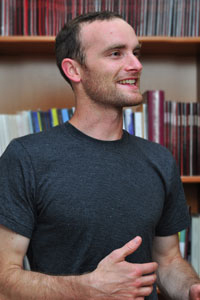
Tristram Wolff
Etymology—a notoriously speculative annex of linguistics—is generally read either as grounded by legitimating philological principles or as naïve, playful, “folk.” In his dissertation Romantic Etymology and Language Ecology, Tristram Wolff (Comparative Literature) traces an alternate history of theories of etymology and the discourse of language origin through literatures of Romanticism. The project reexamines the broadly ecological poetics supporting Romantic etymology, arguing that, rather than simply attaching words to the world, this counter-tradition strives to release or dissolve human language into the matrix of its natural and social environments. Mr. Wolff shows how Romantic writers steeped in etymology forge, through revised figures of “nature,” flexible linguistic relationships not reducible to intended meanings or recognized linguistic units. In reassessing the crucial role of this trope in Romanticism, his project investigates etymology’s neglected history, versatility and rhetorical grounds.